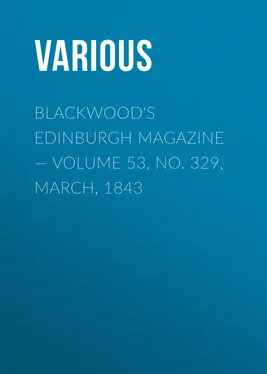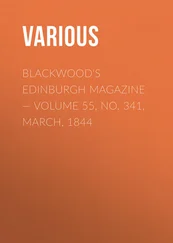Various - Blackwood's Edinburgh Magazine — Volume 53, No. 329, March, 1843
Здесь есть возможность читать онлайн «Various - Blackwood's Edinburgh Magazine — Volume 53, No. 329, March, 1843» — ознакомительный отрывок электронной книги совершенно бесплатно, а после прочтения отрывка купить полную версию. В некоторых случаях можно слушать аудио, скачать через торрент в формате fb2 и присутствует краткое содержание. Издательство: Иностранный паблик, Жанр: foreign_antique, periodic, foreign_edu, на английском языке. Описание произведения, (предисловие) а так же отзывы посетителей доступны на портале библиотеки ЛибКат.
- Название:Blackwood's Edinburgh Magazine — Volume 53, No. 329, March, 1843
- Автор:
- Издательство:Иностранный паблик
- Жанр:
- Год:неизвестен
- ISBN:нет данных
- Рейтинг книги:3 / 5. Голосов: 1
-
Избранное:Добавить в избранное
- Отзывы:
-
Ваша оценка:
- 60
- 1
- 2
- 3
- 4
- 5
Blackwood's Edinburgh Magazine — Volume 53, No. 329, March, 1843: краткое содержание, описание и аннотация
Предлагаем к чтению аннотацию, описание, краткое содержание или предисловие (зависит от того, что написал сам автор книги «Blackwood's Edinburgh Magazine — Volume 53, No. 329, March, 1843»). Если вы не нашли необходимую информацию о книге — напишите в комментариях, мы постараемся отыскать её.
Blackwood's Edinburgh Magazine — Volume 53, No. 329, March, 1843 — читать онлайн ознакомительный отрывок
Ниже представлен текст книги, разбитый по страницам. Система сохранения места последней прочитанной страницы, позволяет с удобством читать онлайн бесплатно книгу «Blackwood's Edinburgh Magazine — Volume 53, No. 329, March, 1843», без необходимости каждый раз заново искать на чём Вы остановились. Поставьте закладку, и сможете в любой момент перейти на страницу, на которой закончили чтение.
Интервал:
Закладка:
The Khan assisted the Bek to extricate himself from the stirrups; but observed with alarm that his efforts had displaced the bandage on Ammalát's wounded arm, and that the blood was soaking through it afresh. The young man, it seemed, was insensible to pain; tears were rolling down his face upon the dead horse. So one drop fills not, but overflows the cup. "Thou wilt never more bear me like down upon the wind," he said, "nor hear behind thee from the dust-cloud of the race, the shouts, unpleasing to the rival, the acclamations of the people: in the blaze of battle no more shalt thou carry me from the iron rain of the Russian cannon. With thee I gained the fame of a warrior—why should I survive, or it, or thee?" He bent his face upon his knee, and remained silent a long time, while the Khan carefully bound up his wounded arm: at length Ammalát raised his head: "Leave me!" he cried, resolutely: "leave, Sultan Akhmet Khan, a wretch to his fate! The way is long, and I am exhausted. By remaining with me, you will perish in vain. See! the eagle soars around us; he knows that my heart will soon quiver beneath his talons, and I thank God! Better find an airy grave in the maw of a bird of prey, than leave my corse beneath a Christian foot. Farewell, linger not."
"For shame, Ammalát! you trip against a straw....! What the great harm? You are wounded, and your horse is dead. Your wound will soon healed, and we will find you a better horse! Allah sendeth not misfortunes alone. In the flower of your age, and the full vigour of your faculties, it is a sin to despair. Mount my horse, I will lead him by the bridle, and by night we shall be at home. Time is precious!"
"For me, time is no more, Sultan Ahkmet Khan ... I thank you heartily for your brotherly care, but I cannot take advantage of it ... you yourself cannot support a march on foot after such fatigue. I repeat ... leave me to my fate. Here, on these inaccessible heights, I will die free and contented ... And what is there to recall me to life! My parents lie under the earth, my wife is blind, my uncle and father-in-law the Shamkhál are cowering at Tarki before the Russians ... the Giaour is revelling in my native land, in my inheritance; and I myself an a wanderer from my home, a runaway from battle. I neither can, nor ought to live."
"You ought not to talk such nonsense, dear Ammalát:—and nothing but fever can excuse you. We are created that we may live longer than our fathers. For wives, if one has not teazed you enough, we will find you three more. If you love not the Shamkhál, yet love your own inheritance—you ought to live, if but for that; since to a dead man power is useless, and victory impossible. Revenge on the Russians is a holy duty: live, if but for that. That we are beaten, is no novelty for a warrior; to-day luck is theirs, to-morrow it falls to us. Allah gives fortune; but a man creates his own glory, not by fortune, but by firmness. Take courage, my friend Ammalát.... You are wounded and weak; I am strong from habit, and not fatigued by flight. Mount! and we may yet live to beat the Russians."
The colour returned to Ammalát's face ... "Yes, I will live for revenge!" he cried: "for revenge both secret and open. Believe me, Sultan Akhmet Khan, it is only for this that I accept your generosity! Henceforth I am yours; I swear by the graves of my fathers.... I am yours! Guide my steps, direct the strokes of my arm; and if ever, drowned in softness, I forget my oath, remind me of this moment, of this mountain peak: Ammalát Bek will awake, and his dagger will be lightning!"
The Khan embraced him, as he lifted the excited youth into the saddle. "Now I behold in you the pure blood of the Emírs!" said he: "the burning blood of their children, which flows in our veins like the sulphur in the entrails of the rocks, which, ever and anon inflaming, shakes and topples down the crags." Steadying with one hand the wounded man in the saddle, the Khan began cautiously to descend the rugged croft. Occasionally the stones fell rattling from under their feet, or the horse slid downward over the smooth granite, so that they were well pleased to reach the mossy slopes. By degrees, creeping plants began to appear, spreading their green sheets; and, waving from the crevices like fans, they hung down in long ringlets like ribbons or flags. At length they reached a thick wood of nut-trees; then came the oak, the wild cherry, and, lower still, the tchinár, 41 41 Tchinár, the palmated-leaved plane.
and the tchindár. The variety, the wealth of vegetation, and the majestic silence of the umbrageous forest, produced a kind of involuntary adoration of the wild strength of nature. Ever and anon, from the midnight darkness of the boughs, there dawned, like the morning, glimpses of meadows, covered with a fragrant carpet of flowers untrodden by the foot of man. The pathway at one time lost itself in the depth of the thicket; at another, crept forth upon the edge of the rock, below which gleamed and murmured a rivulet, now foaming over the stones, then again slumbering on its rocky bed, under the shade of the barberry and the eglantine. Pheasants, sparkling with their rainbow tails, flitted from shrub to shrub; flights of wild pigeons flew over the crags, sometimes in an horizontal troop, sometimes like a column, rising to the sky; and sunset flooded all with its airy purple, and light mists began to rise from the narrow gorges: every thing breathed the freshness of evening. Our travellers were now near the village of Aki, and separated only by a hill from Khounzákh. A low crest alone divided them from that village, when the report of a gun resounded from the mountain, and, like an ominous signal, was repeated by the echoes of the cliffs. The travellers halted irresolute: the echoes by degrees sank into stillness. "Our hunters!" cried Sultan Akhmet Khan, wiping the sweat from his face: "they expect me not, and think not to meet me here! Many tears of joy, and many of sorrow, do I bear to Khounzákh!" Unfeigned sorrow was expressed in the face of Akhmet Khan. Vividly does every soft and every savage sentiment play on the features of the Asiatic.
Another report soon interrupted his meditation; then another, and another. Shot answered shot, and at length thickened into a warm fire. "'Tis the Russians!" cried Ammalát, drawing his sabre. He pressed his horse with the stirrup, as though he would have leaped over the ridge at a single bound; but in a moment his strength failed him, and the blade fell ringing on the ground, as his arm dropped heavily by his side. "Khan!" said he, dismounting, "go to the succour of your people; your face will be worth more to them than a hundred warriors."
The Khan heard him not; he was listening intently for the flight of the balls, as if he would distinguish those of the Russian from the Avárian. "Have they, besides the agility of the goat, stolen the wings of the eagle of Kazbéc? Can they have reached our inaccessible fastnesses?" said he, leaning to the saddle, with his foot already in the stirrup. "Farewell, Ammalát!" he cried at length, listening to the firing, which now grew hotter: "I go to perish on the ruins I have made, after striking like a thunderbolt!" At this moment a bullet whistled by, and fell at his feet. Bending down and picking it up, his face was lighted with a smile. He quietly took his foot from the stirrup, and turning to Ammalát, "Mount!" said he, "you shall presently find with your own eyes an answer to this riddle. The Russian bullets are of lead; but this is copper 42 42 Having no lead, the Aváretzes use balls of copper, as they possess small mines of that metal.
—an Aváretz, my dear countryman. Besides, it comes from the south, where the Russians cannot be."
They ascended to the summit of the crest, and before their view opened two villages, situated on the opposite sides of a deep ravine; from behind them came the firing. The inhabitants sheltering themselves behind rocks and hedges, were firing at each other. Between them the women were incessantly running, sobbing and weeping when any combatant, approaching the edge of the ravine, fell wounded. They carried stones, and, regardless of the whistling of the balls, fearlessly piled them up, so as to make a kind of defence. Cries of joy arose from one side or the other, as a wounded adversary was carried from the field; a groan of sorrow ascended in the air when one of their kinsmen or comrades was hit. Ammalát gazed at the combat for some time with surprise, a combat in which there was a great deal more noise than execution. At length he turned an enquiring eye upon the Khan.
Читать дальшеИнтервал:
Закладка:
Похожие книги на «Blackwood's Edinburgh Magazine — Volume 53, No. 329, March, 1843»
Представляем Вашему вниманию похожие книги на «Blackwood's Edinburgh Magazine — Volume 53, No. 329, March, 1843» списком для выбора. Мы отобрали схожую по названию и смыслу литературу в надежде предоставить читателям больше вариантов отыскать новые, интересные, ещё непрочитанные произведения.
Обсуждение, отзывы о книге «Blackwood's Edinburgh Magazine — Volume 53, No. 329, March, 1843» и просто собственные мнения читателей. Оставьте ваши комментарии, напишите, что Вы думаете о произведении, его смысле или главных героях. Укажите что конкретно понравилось, а что нет, и почему Вы так считаете.












